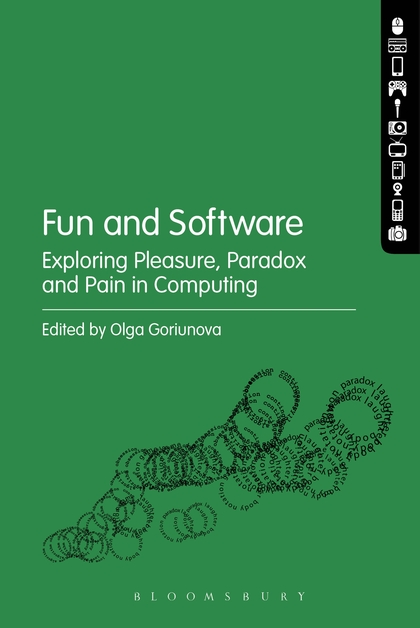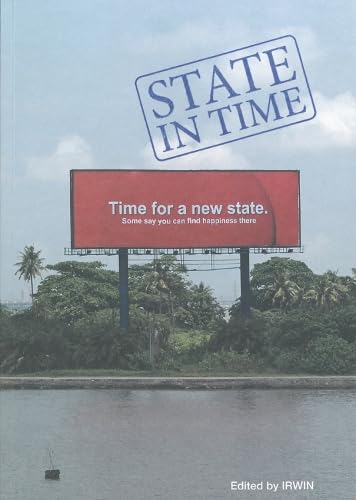Olga Goriunova (ed.): Fun and Software: Exploring Pleasure, Paradox and Pain in Computing (2014)
Filed under book | Tags: · abstraction, aesthetics, affect, algorithm, art, body, code, computing, game, humour, labour, logic, media, media theory, politics, programming, software, software art, software studies, theory, time

“Fun and Software offers the untold story of fun as constitutive of the culture and aesthetics of computing. Fun in computing is a mode of thinking, making and experiencing. It invokes and convolutes the question of rationalism and logical reason, addresses the sensibilities and experience of computation and attests to its creative drives. By exploring topics as diverse as the pleasure and pain of the programmer, geek wit, affects of play and coding as a bodily pursuit of the unique in recursive structures, Fun and Software helps construct a different point of entry to the understanding of software as culture. Fun is a form of production that touches on the foundations of formal logic and precise notation as well as rhetoric, exhibiting connections between computing and paradox, politics and aesthetics. From the formation of the discipline of programming as an outgrowth of pure mathematics to its manifestation in contemporary and contradictory forms such as gaming, data analysis and art, fun is a powerful force that continues to shape our life with software as it becomes the key mechanism of contemporary society.”
Texts by Andrew Goffey, Simon Yuill, Matthew Fuller, Luciana Parisi and M. Beatrice Fazi, Adrian Mackenzie, Michael Murtaugh, Geoff Cox and Alex McLean, Wendy Hui Kyong Chun and Andrew Lison, Christian Ulrik Andersen, Brigitte Kaltenbacher, Annet Dekker, and Olga Goriunova.
Publisher Bloomsbury, New York and London, 2014
New Media and Technology series
ISBN 1623560942, 9781623560942
285 pages
Software studies page on Monoskop
Comment (0)IRWIN (ed.): State in Time (2014)
Filed under book | Tags: · aesthetics, appropriation, art, art theory, contemporary art, politics, retro-avant-garde, theory, utopia

“The NSK State in Time emerged in 1992, evolving in the context of the dissolution of Yugoslavia and the transformation Neue Slowenische Kunst. Existing both as an artwork and a social formation, a state that encompasses all time but holding no territory, the NSK State in Time has for two decades pushed the boundaries of artistic and political practice. This volume collects together, for the first time, analyses of the NSK State in Time including its relationship with the changing context of Eastern Europe, the connection between aesthetics and the state, the rise of NSK folk art, and documents the First NSK Citizen’s Congress in 2010.”
Includes essays by Inke Arns, Huang Chien-Hung, Eda Čufer, Marina Gržinić, Irwin, Tomaz Mastnak, Viktor Misiano, Alexei Monroe, Ian Parker, Avi Pitchon, Stevphen Shukaitis, Slavoj Žižek, and Jonah Westerman.
Publisher Minor Compositions, Wivenhoe / New York / Port Watson, 2014
Open Access
ISBN 9781570272769
178 pages
Isabelle Stengers: The Invention of Modern Science (1993–) [EN, PT]
Filed under book | Tags: · apparatus, epistemology, event, fact, fiction, history of science, mathematics, philosophy of science, physics, politics, science, sociology, theory, truth

The so-called exact sciences have always claimed to be different from other forms of knowledge. How are we to evaluate this assertion? Should we try to identify the criteria that seem to justify it? Or, following the new model of the social study of the sciences, should we view it as a simple belief? The Invention of Modern Science proposes a fruitful way of going beyond these apparently irreconcilable positions, that science is either “objective” or “socially constructed.” Instead, suggests Isabelle Stengers, one of the most important and influential philosophers of science in Europe, we might understand the tension between scientific objectivity and belief as a necessary part of science, central to the practices invented and reinvented by scientists.
First published in French as L’Invention des sciences modernes, La Découverte, Paris, 1993.
English edition
Translated by Daniel W. Smith
Publisher University of Minnesota Press, 2000
Theory Out of Bounds series, 19
ISBN 0816630569, 9780816630561
185 pages
Review (Robert Evans, Contemporary Sociology, 2002)
Commentary (Stephen Shaviro, 2004)
Publisher (EN)
Google books (EN)
The Invention of Modern Science (English, trans. Daniel W. Smith, 2000)
A invenção das ciências modernas (Portuguese, trans. Max Altman, 2002)

